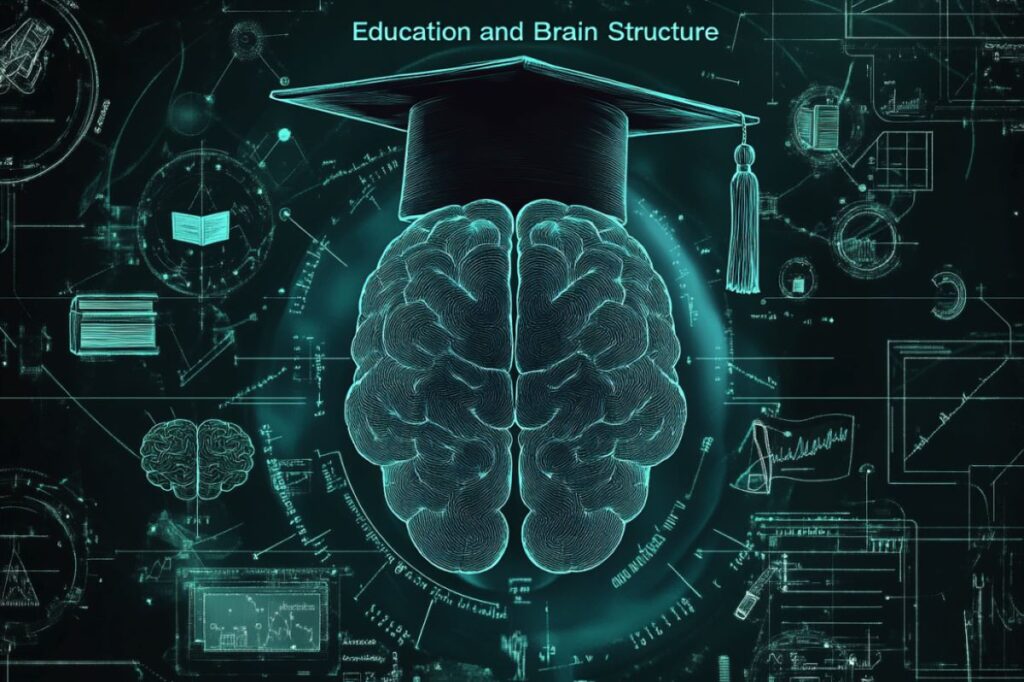[ad_1]
Summary: A recent study explored whether additional years of education lead to long-term changes in brain structure, especially in protecting against brain aging. Analyzing data from a unique natural experiment involving nearly 30,000 individuals, researchers found no detectable impact on brain structure from an additional year of education.
Although education is linked to better cognitive skills and health, it does not appear to alter the brain’s physical structure in the long run. Researchers suggest that any initial structural impact may be temporary or too small to detect with MRI technology. These findings highlight the need for caution when linking education directly to brain structure based on correlations alone.
Key Facts:
- Education correlates with cognitive and health benefits but shows no lasting effect on brain structure.
- The study used a natural experiment, comparing brain scans from individuals with and without an additional year of school.
- The impact of education on brain structure may be temporary or microscopic, evading MRI detection.
Source: Radboud University
It is well-known that education has many positive effects. People who spend more time in school are generally healthier, smarter, and have better jobs and higher incomes than those with less education.
However, whether prolonged education actually causes changes in brain structure over the long term and protects against brain aging, was still unknown.

It is challenging to study this, because alongside education, many other factors influence brain structure, such as the conditions under which someone grows up, DNA traits, and environmental pollution.
Nonetheless, researchers Rogier Kievit (PI of the Lifespan Cognitive Dynamics lab) and Nicholas Judd from Radboudumc and the Donders Institute found a unique opportunity to very precisely examine the effects of an extra year of education.
Aging
In 1972, a change in the law in the United Kingdom raised the number of mandatory school years from fifteen to sixteen, while all other circumstances remained constant. This created an interesting ‘natural experiment’, an event not under the control of researchers which divides people into an exposed and unexposed group.
Data from approximately 30,000 people who attended school around that time, including MRI scans taken much later (46 years after), is available. This dataset is the world’s largest collection of brain imaging data.
The researchers examined the MRI scans for the structure of various brain regions, but they found no differences between those who attended school longer and those who did not.
‘This surprised us’, says Judd.
‘We know that education is beneficial, and we had expected education to provide protection against brain aging. Aging shows up in all of our MRI measures, for instance we see a decline in total volume, surface area, cortical thickness, and worse water diffusion in the brain. However, the extra year of education appears to have no effect here.’
Brain structure
It’s possible that the brain looked different immediately after the extra year of education, but that wasn’t measured.
‘Maybe education temporarily increases brain size, but it returns to normal later. After all, it has to fit in your head’, explains Kievit.
‘It could be like sports: if you train hard for a year at sixteen, you’ll see a positive effect on your muscles, but fifty years later, that effect is gone.’
It’s also possible that extra education only produces microscopic changes in the brain, which are not visible with MRI.
Both in this study and in other, smaller studies, links have been found between more education and brain benefits. For example, people who receive more education have stronger cognitive abilities, better health, and a higher likelihood of employment. However, this is not visible in brain structure via MRI.
Kievit notes: ‘Our study shows that one should be cautious about assigning causation when only a correlation is observed. Although we also see correlations between education and the brain, we see no evidence of this in brain structure.’
About this brain aging and cognition research news
Author: Pauline Dekhuijzen
Source: Radboud University
Contact: Pauline Dekhuijzen – Radboud University
Image: The image is credited to Neuroscience News
Original Research: Open access.
“No effect of additional education on long-term brain structure – a preregistered natural experiment in thousands of individuals” by Rogier Kievit et al. eLife
Abstract
No effect of additional education on long-term brain structure – a preregistered natural experiment in thousands of individuals
Education is related to a wide variety of beneficial health, behavioral, and societal outcomes. However, whether education causes long-term structural changes in the brain remains unclear.
A pressing challenge is that individuals self-select into continued education, thereby introducing a wide variety of environmental and genetic confounders. Fortunately, natural experiments allow us to isolate the causal impact of increased education from individual (and societal) characteristics.
Here, we exploit a policy change in the UK (the 1972 ROSLA act) that increased the amount of mandatory schooling from 15 to 16 years of age to study the impact of education on long-term structural brain outcomes in a large (n∼30.000, UK Biobank) sample.
Using regression discontinuity – a causal inference method – we find no evidence of an effect from an additional year of education on any structural neuroimaging outcomes.
This null result is robust across modalities, regions, and analysis strategies. An additional year of education is a substantial cognitive intervention, yet we find no evidence for sustained experience-dependent plasticity.
Our results provide a challenge for prominent accounts of cognitive or ‘brain reserve’ theories which identify education as a major protective factor to lessen adverse aging effects.
Our preregistered findings are one of the first implementations of regression discontinuity on neural data – opening the door for causal inference in population-based neuroimaging.
[ad_2]
Source link

